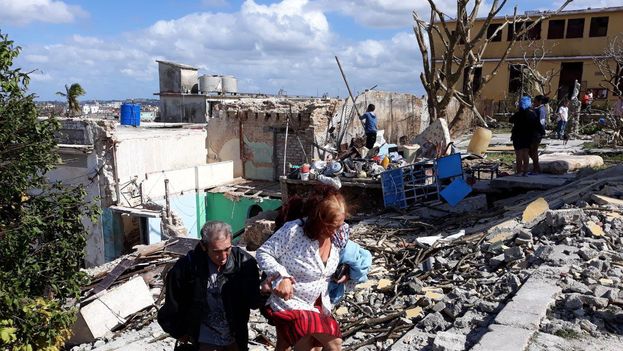
Fernando Dámaso, 4 March 2019 — As had been predetermined, the monstrosity of a constitution was ratified in a referendum last Sunday, February 24, in spite of the clumsy manipulation of polling data by the regime.
The reasons vary: government induced fear and an insane level of propaganda; political pressure exerted on workers, intellectuals, artists, athletes, professionals and students, who are elegible to vote, and and even on infants, who are not; all clamoring “I Vote Yes!”
Though no figures have been released, the amount of money and resources spent on the campaign must have far outstripped those of any presidential election held in the United States, which Cuban leaders and their front men never fail to criticize. In addition, the “Don’t Vote” and “Vote NO” campaigns, which left the opposition ridiculously divided, were suppressed.
With state monopoly of all media, including social networks, citizens were bombarded with constant sermonizing, leaving opponents with no legal public platforms to express themselves.
As of the 24th, Cuba has a new constitution, though it will require an additional twenty-four months for its articles to be formulated before it can be put into practice. Given the circumstances, it is likely to be the shortest-lived Constitution in the history of Cuba, surpassed only perhaps by the ephemeral Baraguá constitution, which lasted only a few days, during which time Antonio Maceo tried in vain to prolong a war that had already ended. It was an attempt to extend the life, at least on paper, of a failed revolution.
Shortly after Dr. Ramón Grau San Martín became President of the Republic in 1944, the island was hit by a devastating hurricane, which led the press to predict, “The new government threatens to be stormy.” And that’s was happened.
Since the current “designate” assumed the presidency, there has been a terrible airline crash in which there was only one survivor, intense rains and floods have washed away crops, homes, roads and bridges in central Cuba, and a tornado has destroyed parts of the already heavily damaged areas of Santos Suárez, Regla, Guanabacoa, and San Miguel near Havana. As if that were not enough, a meteorite has even broken up over Pinar del Río.
If we had a free press, it would predict that “the new government threatens to be disastrous.” On top of repeated economic failures, industrial decline, lack of investment and the deterioration of social services, we must now add the fall — sooner of later — of the Maduro regime in Venezuela, our main sponsor.
As a result, alarm bells have gone off and Cuban officials now spend hours flying around the world, looking for new partners who might be willing to “throw a rope,” as the local saying goes. But times have changed.
I doubt that Europe, which is having serious problems with some of its major member countries, is inclined to provide new credits knowing they might not be repaid. Russia is now capitalist, as are all the republics which made up the former Soviet Union.
Similarly, China and Vietnam have adopted market economies. In all of them, things cost money and nothing is free. If they extend credit, it must be repaid with corresponding interest. Even isolated North Korea, which has nothing to give, is in talks with the United States, its historic adversary.
In Latin America they have shut the door, with the exception of the indigenous Aymaran*, who spends his time ranting about the empire, blaming poultry consumption for causing homosexuality and worshiping the goddess Pachamama through dance.
Lacking resources, few can help their “brother president.” Mexico — a country immersed in serious problems on its northern and southern borders, as well as others such as drug trafficking, a violent crime wave, and longstanding, widespread corruption — does not have time to deal with its complicated Caribbean neighbor.
The little surrounding islands are of no use since, by necessity, they take more than they give. That leaves only Canada and the United States, and the former has always coordinated its policy in the region with the latter. In short, to escape the quagmire and save Cuba, dialogue with the latter is essential, but that does not necessarily mean also saving its government.
Dialogue, however, will require abandoning the brusque swagger, the childish arrogance, the antiquated dogmas, the rampant and cocky stupidity, and the outlandish demands. A dialogue requires two suitcases: a full one from which to give and an empty one in which to receive.
May God and the Orishas open our leaders’ eyes to the prevailing bleak reality so that they might think of Cuba and the Cubans, and set aside their addiction to absolute power. Otherwise, they will be consumed by the fire of Lucifer and Shangó.
*Translator’s note: A reference to President Evo Morales of Bolivia.
